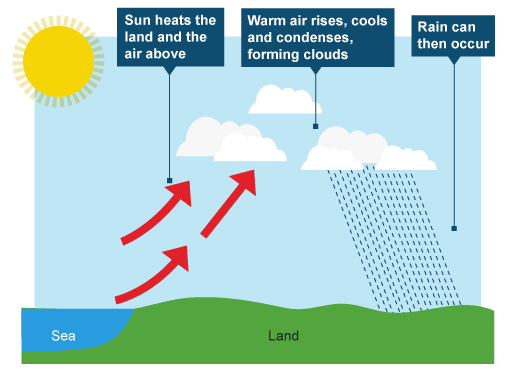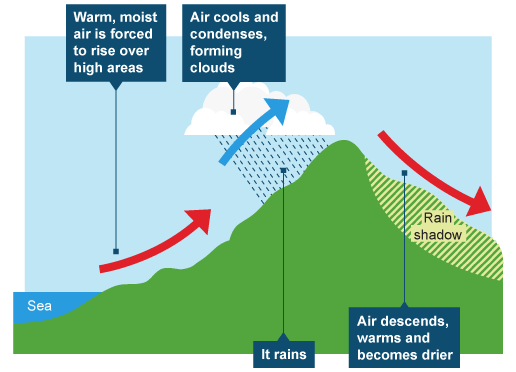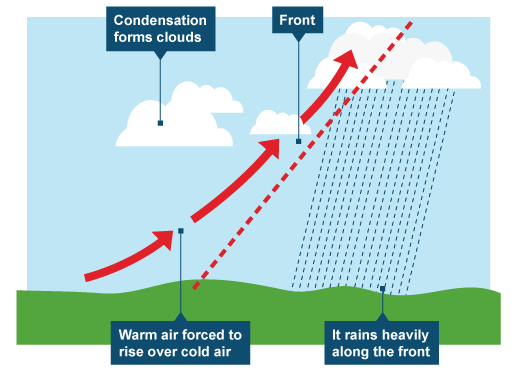Rain, most simply defined, are the droplets of water that fall from the clouds. Droplets of water, within a cloud, condense onto each other to form bigger droplets. The heaviness of the bigger droplets makes it impossible for them to stay suspended in the cloud hence they fall on earth as rainfall.
How Are Clouds Formed?
The process of formation of clouds begins with evaporation and transpiration happening on the surface of the earth. The water molecules formed due to evaporation and transpiration rise up due to their lesser weight till they reach the frost point. These suspended water droplets in the air start forming a huge cluster that is called a cloud. When the droplets within the cloud become heavy they fall to the ground as rain showers.
Interesting Fact: The darker clouds bring us rain. The dark color of these rain-producing clouds can be attributed to the bigger size of water droplets contained in them. The bigger droplets block out the light coming from the sun and hence they appear dark.
Measuring the Intensity of Rainfall
The measurement of the amount of rain over a given period of time is called the intensity of rain. It is measured in terms of height the rainwater will cover if it stays where it falls. And, the measurement is expressed in millimeters.
The device most commonly used to measure rain is a simple cylindrical funnel with a marking scale on the side. The device is called a rain gauge. Modern weather stations use Tipping Bucket Rain Gauge which also works on the same principle of measuring the height of rainwater falling at a certain location.
Based on intensity rainfall is classified into three groups. They are as follows:
- Light Rain ranges between 0 to 2.5 mm
- Moderate Rain varies between 2.6 mm to 7.6 mm
- Heavy Rain means rainfall above 7.6 mm
Types of Rainfall based on Origin
Based on their origin, rainfall can be of three types namely – Convectional rainfall, Orographic or relief rainfall and Cyclonic or frontal rainfall.
1. Convectional rainfall
This type of rainfall is seen predominantly in the equatorial regions and interior parts of continents in the northern hemisphere. This type of rainfall normally occurs in summer or the hotter part of the day. Hot air rises up in convection current and forms cumulus clouds which pours down as heavy rain with lightning and thunder. Convectional rainfall does not last long.

2. Orographic rainfall
This is the type of rainfall is also known as Relief Rainfall and is associated with mountains. The main characteristic of orographic rainfall is that it gives the majority of the rainfall to the windward side of the mountain while the leeward side often remains dry and rainless. This type of rain happens when clouds come across mountains and need to rise up. As the cloud rises up, the temperature cools and condenses moisture which forms bigger droplets of water within the cloud. The time these clouds cross the mountain their temperature increases which in turn increases their capacity to absorb moisture. And, hence the leeward side does not get the rain.

3. Cyclonic rainfall
Also known as frontal rainfall. The cyclonic rain, as the name suggests, occurs along the fronts of a cyclone. This type of rainfall is formed when two air masses with different density, temperature and humidity meet at a place. As the warm air rises, moisture present in it condenses to form altostratus clouds. Cyclonic rainfall falls gradually for a few hours to a few days.

Use the citation below to add this article to your bibliography
"What is Rainfall? Definition, Measurement, Intensity and Types." Dashamlav.com. Web. 1 May 2025. <https://dashamlav.com/rainfall-definition-types-measurement-intensity/>
Dashamlav.com, "What is Rainfall? Definition, Measurement, Intensity and Types." Accessed 1 May 2025. https://dashamlav.com/rainfall-definition-types-measurement-intensity/
"What is Rainfall? Definition, Measurement, Intensity and Types." (n.d.). Dashamlav.com. Retrieved 1 May 2025 from https://dashamlav.com/rainfall-definition-types-measurement-intensity/
